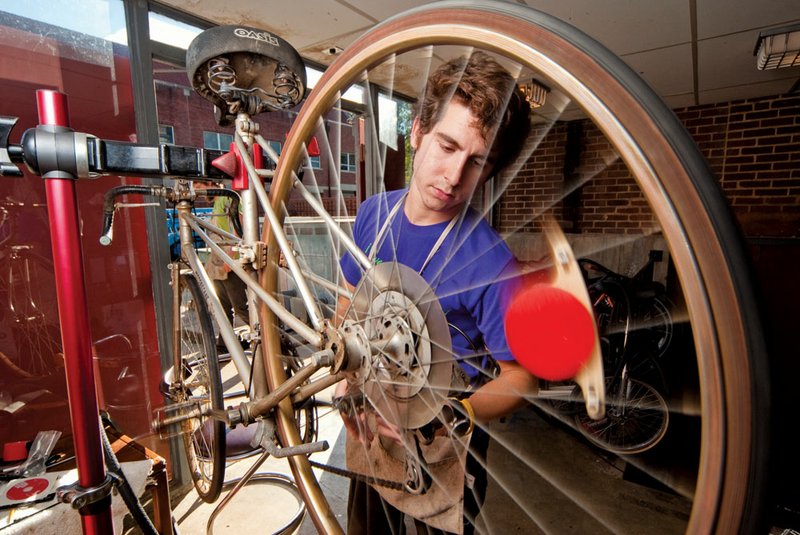CONWAY — The bike racks at Hendrix College may be full, but that doesn’t mean the bicycles are ready to ride.
Neglect, plus flat tires and lots of rust, mean many college students have a hard time keeping their gear road-ready. It’s an expensive business: Just a tuneup can cost $50 at a professional bike shop. Major repairs can run hundreds of dollars.
The Hendrix Bike Revolution is there to try to help. In 2006, the student-run club was founded to help encourage students to do more bicycling. The senior founders started helping with minor repairs when they could. When the club was eventually handed down to Brennan McGinn in 2009, he and a friend decided the best way to help encourage biking on campus was to help students keep their gear in riding condition.
“We ended up working with the school and getting space for a shop,” said McGinn, who now works as assistant manager at the Conway bike shop The Ride.
With donated tools and funding support from the Hendrix Student Senate, the bike shop has grown into a place that five to 10 students a day rely on for fixes. The shop, open from 5-10 p.m. Monday through Thursday, is now staffed by two paid members of the Hendrix Bike Revolution, Adam Grippo and Michael Ottenlips. The student mechanics each receive a stipend of $1,200 a year for their work.
“We get a lot of tube changes from flat tires, and brake adjustments,” Grippo said, pouring over the shop’s crammed log book. The labor is free, but students have to pay for parts. The bill is typically much more manageable than what a student might encounter at an off-campus shop.
“Someone once brought in a completely rusted-out red Schwinn bike and wanted it to be his commuter,” Grippo said. “I think that one took us two months to finish.”
Grippo said the student ended up paying around $100 for their work. If he had taken it to The Ride, “we would have recommended he didn’t do the repairs. … It would have been too expensive,” McGinn said.
With the Hendrix student population growing, the bike shop is often backed up with work, especially in early fall and late spring. Grippo and Ottenlips estimate there are about 400 students with bicycles on campus, and around 50 percent of those students ride on a regular basis. The mechanics said they see the number grow each year.
“Hendrix is a small campus, so you don’t really need to bike, but people are really focused on sustainability and not needing to rely on a car for things like grocery runs,” McGinn said. “Conway has gotten more bike-friendly over the years with more lanes. I don’t feel like I’m endangered when I ride across town.”
Grippo, a senior with a major in chemistry, started bicycle racing when he was in high school, and learned to fix bikes with his dad to save on costs. Grippo will hand down his tools to an apprentice when he graduates, just as McGinn did with him. The process ensures that the Hendrix Bike Revolution keeps up with student demands. Ottenlips, a junior who learned to fix bikes while he was busy wrecking them while mountain biking, will stick around next year.
As a club, the Bike Revolution would like to expand its riding program to not just focus on repair, but on actively encouraging students to bicycle more often. With a budget of just more than $5,000 this year, the club was able to purchase five new bikes to add to the fleet that they rent out from the school library. The 10 bikes are often all checked out, especially on nice days.
In addition to repairs, Grippo and Ottenlips try to act as teachers when they can, helping people learn to pump up tires or do their own brake adjustments, and even change a tire.
“I’d say 90 percent of the students who come in here are clueless,” Grippo said. “Neglect is the biggest thing we battle.”
Though an off-campus bike shop may be only a few miles away, the convenience of having a free place to go on campus is what keeps many students coming back. And a friendly face doesn’t hurt.
“Hopefully, we’re more approachable since we’re students, too,” Grippo said.
Staff writer Emily Van Zandt can be reached at (501) 399-3688 or evanzandt@arkansasonline.com.
